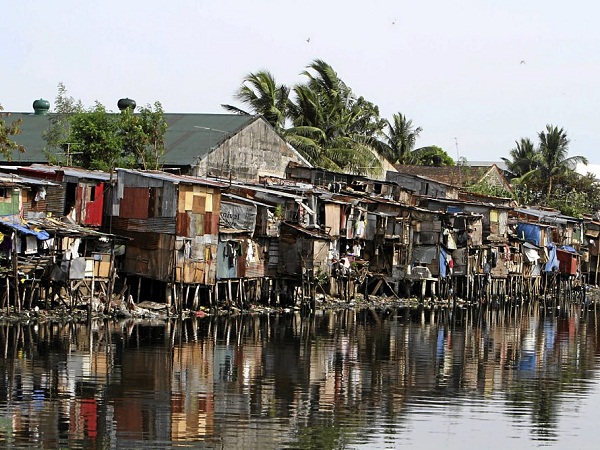
IN ADDRESSING the housing needs in our country, SHDA believes that a roadmap must take into consideration urban dwellers living in slums. JOAN BONDOC
(First of two parts)
How important is housing to healthy human and community development? According to Anaclaudia Rossbach, consultant for World Bank on low-income housing settlements and metropolitan management, it matters in ways both subtle and profound.
“It’s goes far beyond having a warm and secure place to sleep. In fact, providing slum dwellers with decent housing offers a good social and financial return—such move could even solve the housing backlog that has plagued countries around the world,” said Rossbach speaking before the country’s top developers who attended the national convention of the Subdivision and Housing Developers Association in Davao City.
Rossbach is no stranger to the slum challenge as her home country Brazil is also beset with such a problem: 44-million people are still living with inadequate urban housing or utilities.
“But Brazil is now succeeding in dealing with the slum problem not by benign neglect or involuntary resettlement but by more positive policies such as self-help and in situ (in the same location) upgrading as well as enabling and rights-based policies,” said SHDA chair Manuel Crisostomo.
Closely intertwined
Just like the slum communities in Brazil and in other parts of the world, Crisostomo said those here in the Philippines are closely intertwined with the city’s formal economy and as a result play an important role in solving many problems.
The Metro Manila Development Authority estimates that in Metro Manila alone, there are already more than 500,000 families living in slum areas, more than 200,000 of them occupy government-owned lands while around 175,000 families occupy private-owned lands.
Crisostomo said: “We should recognize and help these families because majority of them work in Metro Manila, ensuring that the needs of the higher-income families are met. They work in factories, construction sites and even in dumpsites (to recycle solid wastes), do a variety of home-based enterprises (tailors, laundry) or work as domestic servants, security guards or street vendors. If we help their families acquire decent housing this country may be able to hasten bridging the housing gap and overcome shortage in housing.”
This is why during the national convention, the “Housing Industry Roadmap 2012-2030” that SHDA launched recognized the need to assist slum dwellers (the roadmap is a joint undertaking with the Center for Research and Communication-University of Asia and the Pacific).
New roadmap
SHDA national president Paul Tanchi said: “We realized in recent years that we need to formulate a new roadmap because the current housing demand and supply profile excludes the 832,046 households that can’t afford financing. If left unchecked, existing trends indicate that the total backlog, which has been hounding the country for decades now, could balloon to 6.5 million units by 2030. Thus, drastic plans and programs must be implemented.”
The country is currently facing a 3.9-million housing backlog.
Tanchi added that the lack of funding support for the socialized and marginalized sectors should be given priority.
“By studying the current state of the housing industry, knowing our capabilities, and taking cue from both failed and successful strategies that have been implemented here and abroad, we have banded together to determine the most feasible steps to take in curbing the current housing backlog,” Tanchi said.
The Housing Industry Roadmap 2012-2030 seeks to increase housing production by 1 million by 2016, 2 million by 2022 and 7 million by 2030.
The roadmap also seeks to mobilize and generate housing finance for end-user financing support, equivalent to P130 billion annually from 2012 to 2016; P236 billion annually from 2017 to 2022; and P523 billion annually from 2023 to 2030 as well as improve the regulatory environment for housing through the faster processing of housing permits, resolution of conflicts between local and national housing policies and guidelines; and the enhancement of the representation of the housing industry in policy forums.
“But more importantly, the roadmap will also find ways to enhance shelter affordability through a comprehensive housing subsidy program for targeted beneficiaries, through direct provision of housing to those who cannot afford,” said Tanchi who added that the Brazil experience greatly contributed in the drafting of the roadmap.
Crisostomo added that this roadmap brings to the foreground the challenge to all stakeholders to work together to address the housing problem by determining the true extent of the housing backlog, identifying the priority areas for immediate action, and formulating multi-year strategies until the backlog is erased by 2030.
The roadmap also seek the following:
Ways to lessen delays in the issuance of development permits in local government units;
Conflicting and redundant local and national policies;
Utilities costs absorbed by developers and buyers;
Lack of drainage and sewerage systems;
Fast turnover and brain drain in the industry’s key human resources;
Strict bank requirement;
The lack of qualified contractors, increasing labor costs; restrictive guidelines on selling and marketing activities;
An absence of institutionalized estate management program;
Delayed passing of Department of Housing and Urban Development bill and other pending bills abolishing any form of incentives; and
Obliging developers to also comply with the 20-percent socialized requirement of Urban Development and Housing Act.
The preceding issues are also discussed in the roadmap that will be presented to Vice President Jejomar Binay who also chairs the Housing and Urban Development Coordinating Council.
“As such, we, from the housing industry call on all sectors of society to participate in pushing the roadmap. It may still need some fine tuning but it is a start and with the support and participation of the private, the public and the social sectors, we can turn the 2030 vision into reality,” Tanchi said.